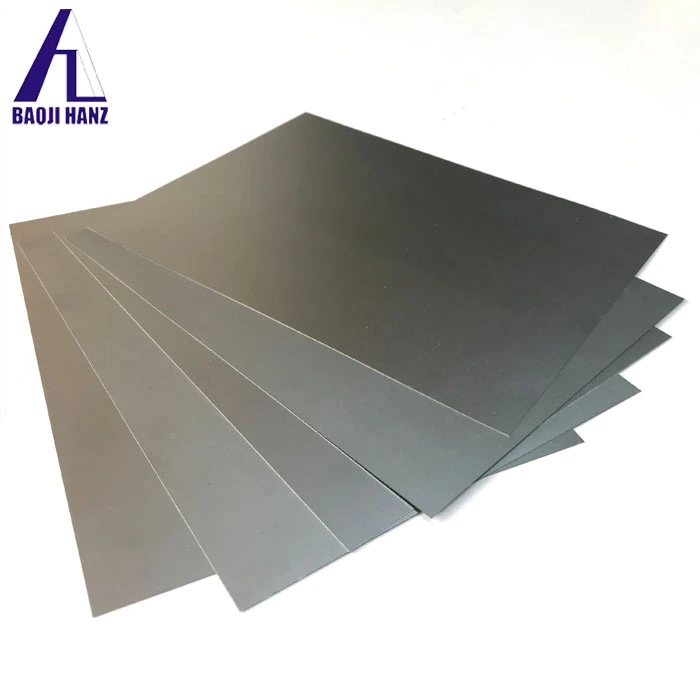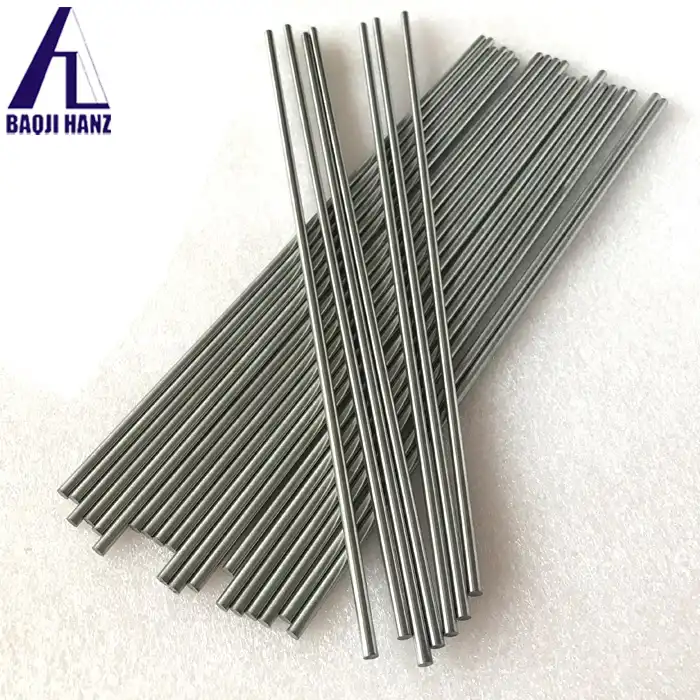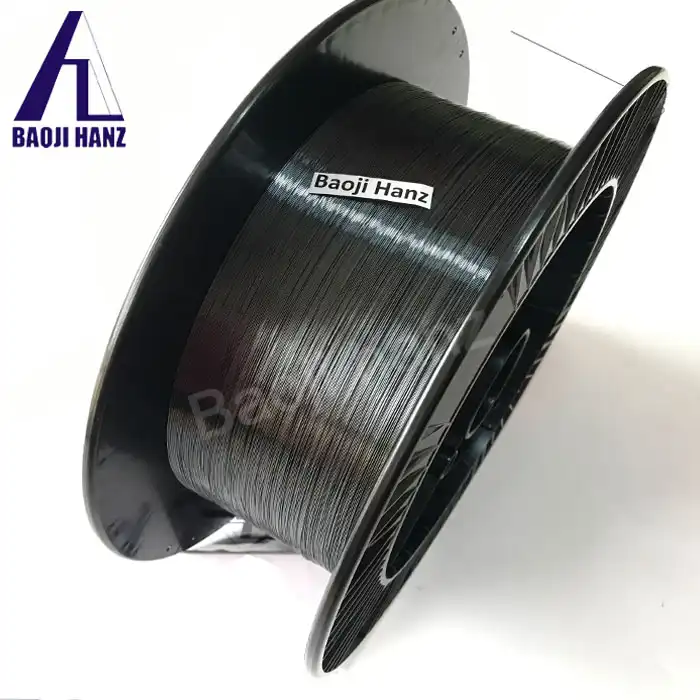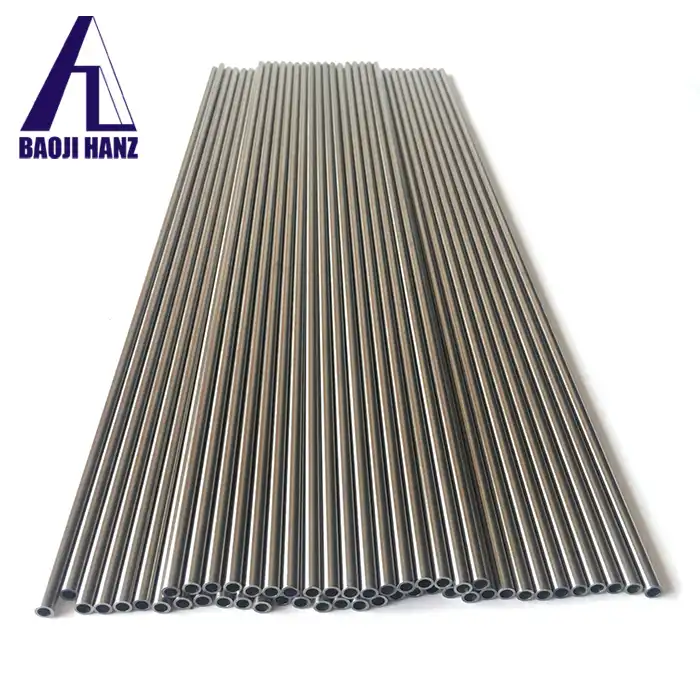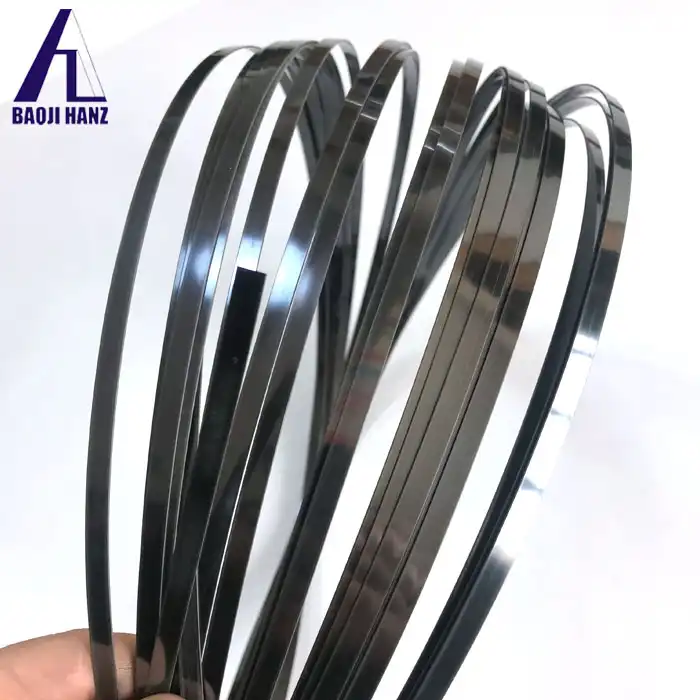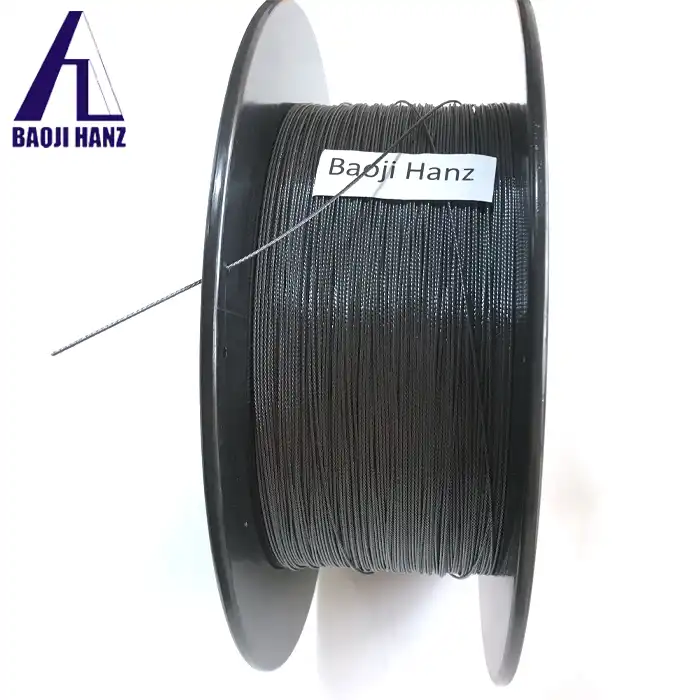What are the Applications of Medical Super Elastic Nickel Titanium Flat Wire?
2025-04-18 18:03:52
Medical super elastic nickel titanium flat wire has revolutionized numerous medical applications due to its remarkable properties. This specialized alloy, commonly known as nitinol, combines exceptional flexibility with strength and shape memory characteristics that make it indispensable in modern healthcare. As we explore the diverse applications of this innovative material, we'll discover how it has transformed medical devices, surgical instruments, and implantable technologies. The unique combination of superelasticity, biocompatibility, and thermal responsiveness has positioned medical super elastic nickel titanium flat wire as a cornerstone material in advancing patient care and medical innovation.
Essential Applications in Cardiovascular Medicine
Vascular Stents and Grafts
Medical super elastic nickel titanium flat wire has become a critical component in the manufacturing of vascular stents and grafts, revolutionizing cardiovascular treatments. These devices are designed to maintain or restore blood flow in narrowed or blocked arteries. Baoji Hanz Metal Material Co., Ltd. proudly offers Medical Super Elastic Nickel Titanium Flat Wire with specific properties that make it ideal for these applications. With a nickel content of 54% and titanium content of 46%, this nitinol alloy provides the perfect balance of flexibility and strength required for vascular implants. The superelastic properties ensure that stents can be compressed for delivery through small catheters and then expand to their predetermined shape once deployed in the blood vessel. Its tensile strength of 800pa guarantees durability even under constant pulsatile forces within arteries. The material's superior flexibility allows these stents to conform to the natural curvature of blood vessels, reducing the risk of vessel damage while providing necessary support. What truly sets medical super elastic nickel titanium flat wire apart is its thermal memory function – the ability to activate at specific body temperatures ensures consistent performance once implanted. This ISO13485:2016 certified material maintains its integrity even during long-term implantation, making it the trusted choice for life-saving cardiovascular interventions.
Guidewires and Catheters
In interventional cardiology and radiology, medical super elastic nickel titanium flat wire has transformed the capabilities of guidewires and catheters. These essential tools navigate through the complex vascular system to reach targeted treatment areas. The remarkable superelastic properties of nickel titanium flat wire from Baoji Hanz Metal Material Co., Ltd. allow guidewires to bend and flex without kinking while maintaining the torque control necessary for precise navigation. With an impurity content of just 0.001%, our high-purity nitinol ensures biocompatibility and minimizes any risk of adverse reactions within the body. The wire's shape memory effect enables guidewires to remember their original configuration, facilitating navigation through tortuous vessels while reducing trauma to vessel walls. This property is particularly valuable in procedures requiring access to difficult-to-reach anatomical locations. The material's operating temperature threshold of less than 80°C makes it suitable for various sterilization methods without compromising performance. Additionally, the corrosion resistance of our medical super elastic nickel titanium flat wire ensures prolonged functionality even when exposed to bodily fluids. For manufacturers of endovascular devices, our material offers consistent quality and performance, backed by ISO9001:2015 certification. The combination of flexibility, strength, and durability has made medical super elastic nickel titanium flat wire the gold standard for guidewires and catheters used in minimally invasive cardiovascular procedures, significantly reducing patient recovery times and improving procedural outcomes.
Heart Valve Frames and Occluders
The advent of transcatheter heart valve replacements and repairs has been made possible largely due to the unique properties of medical super elastic nickel titanium flat wire. Baoji Hanz Metal Material Co., Ltd. supplies this specialized material with a hardness of 30bh, providing the perfect balance of rigidity and flexibility required for heart valve frames. These frames must compress to fit through delivery catheters yet expand to precise dimensions once deployed, maintaining their shape under the constant stress of cardiac cycles. Our nickel titanium alloy, with its 54% nickel and 46% titanium composition, exhibits unparalleled shape memory properties that allow heart valve frames to be crimped during insertion and then expand to their predetermined shape at body temperature, creating a secure seal against the native tissue.
The high strength of our medical super elastic nickel titanium flat wire (tensile strength: 800pa) ensures these frames maintain their structural integrity despite the continuous mechanical stresses of cardiac function. Similarly, cardiac occluders used to seal structural defects like patent foramen ovale or atrial septal defects benefit from the same superelastic properties, conforming to the unique anatomy of each patient while providing reliable closure. The biocompatibility of our material, verified through ISO13485:2016 certification, mitigates the risk of thrombus formation or tissue reaction, making it the ideal choice for these permanent implants. Manufacturers appreciate our large amount of ready stock and competitive pricing, enabling them to respond quickly to clinical demands. The exceptional material properties of medical super elastic nickel titanium flat wire have fundamentally changed treatment options for structural heart disease, offering less invasive alternatives to traditional open-heart surgery and improving outcomes for countless patients worldwide.
Orthopedic and Spinal Applications
Bone Fixation Devices
Medical super elastic nickel titanium flat wire has revolutionized bone fixation technologies, offering significant advantages over traditional metallic implants. Baoji Hanz Metal Material Co., Ltd. produces this specialized material with precise controls over its composition (54% nickel, 46% titanium) and mechanical properties (tensile strength: 800pa, hardness: 30bh), making it ideal for orthopedic applications. What distinguishes our medical super elastic nickel titanium flat wire in bone fixation devices is its ability to exert constant, gentle pressure on healing bone fragments due to its superelastic nature. Unlike conventional metal implants that maintain rigid positioning, nitinol-based fixation systems can accommodate small movements while maintaining alignment, which has been shown to promote faster healing through micromotion at fracture sites. This dynamic stabilization better mimics the natural healing process.
The temperature sensitivity of our material allows for easier implantation—surgeons can cool the device for insertion, and once it warms to body temperature, it adapts to the exact anatomical requirements, creating optimal compression across the fracture line. With an impurity content of just 0.001%, our medical-grade wire meets the stringent requirements for long-term implantation, minimizing the risk of inflammatory responses or metal sensitivities. Orthopedic surgeons particularly value the material's ability to resist deformation under physiological loads while maintaining its predetermined shape, ensuring consistent compression throughout the healing process. These properties make medical super elastic nickel titanium flat wire particularly valuable in treating complex fractures in weight-bearing bones or areas subject to repetitive stress. Additionally, the material's biocompatibility, verified through ISO13485:2016 certification, eliminates concerns about adverse tissue reactions, particularly important in long-term implantation scenarios. The unique combination of strength, flexibility, and biocompatibility has established medical super elastic nickel titanium flat wire as an indispensable material in modern orthopedic fixation systems.
Spinal Correction Systems
The treatment of spinal deformities and instabilities has been transformed by the introduction of medical super elastic nickel titanium flat wire-based correction systems. Baoji Hanz Metal Material Co., Ltd. supplies this specialized material with exceptional properties that address the unique challenges of spinal applications. Traditional rigid spinal instrumentation systems often lead to adjacent segment disease and reduced mobility, but devices utilizing our medical super elastic nickel titanium flat wire offer dynamic stabilization that better preserves natural movement patterns. With its superior flexibility and shape memory effect, this material allows for the creation of rods and connectors that provide controlled flexibility while maintaining correction of spinal deformities. The wire's tensile strength of 800pa ensures durability under the complex loading patterns of the spine, while its superelastic properties prevent permanent deformation during normal patient movements.
One of the most valuable aspects of our medical super elastic nickel titanium flat wire in spinal applications is its ability to maintain constant corrective forces, gradually guiding vertebrae into proper alignment instead of forcing immediate correction. This more physiological approach reduces stress on surrounding tissues and lowers the risk of instrumentation failure. The material's high purity (impurity content: 0.001%) and biocompatibility make it suitable for long-term implantation, with minimal risk of inflammatory responses or metal sensitization. Spinal surgeons appreciate the material's consistency and reliability, backed by ISO9001:2015 and ISO13485:2016 certifications, ensuring that each batch performs according to exact specifications. Our medical super elastic nickel titanium flat wire is available with customization options to meet specific design requirements for different spinal pathologies. The unique combination of strength, flexibility, and biocompatibility has established this material as a cornerstone in the development of next-generation spinal correction systems that balance stability with preserved mobility, significantly improving patient outcomes and quality of life following spinal interventions.
Orthopedic Trauma Implants
The field of orthopedic trauma has embraced medical super elastic nickel titanium flat wire for its ability to address complex fractures and bone deformities with unprecedented efficacy. Baoji Hanz Metal Material Co., Ltd. produces this specialized material with consistent quality (ISO9001:2015 certified) and medical-grade properties (ISO13485:2016 certified) that make it ideal for trauma implants. Unlike static implants made from traditional alloys, devices utilizing our medical super elastic nickel titanium flat wire can adapt to changing physiological conditions during healing. The material's most valuable property in trauma applications is its ability to exert continuous, gentle force that promotes proper bone alignment while accommodating the natural micromotion essential for optimal healing. With a nickel content of 54% and titanium content of 46%, our wire achieves the perfect balance of flexibility and rigidity required for various trauma applications. Intramedullary nails and plates made from medical super elastic nickel titanium flat wire conform to the exact anatomical contours after insertion, creating better contact with bone surfaces and more uniform stress distribution.
This reduces the risk of stress shielding, a common complication with rigid implants that can lead to bone resorption and weakness. The material's superelastic properties allow trauma implants to absorb and distribute impact forces more effectively than conventional metals, reducing the risk of fixation failure in active patients. Additionally, the shape memory effect enables the creation of self-adjusting fixation systems that can maintain optimal compression across fracture sites throughout the healing process. Orthopedic surgeons value the material's hardness (30bh) for providing sufficient stability while allowing controlled micromotion. With an operating temperature threshold below 80°C, these implants maintain their mechanical properties under all physiological conditions. The combination of high strength, flexibility, and biocompatibility makes medical super elastic nickel titanium flat wire an invaluable material in advancing trauma care, particularly for complex fractures in weight-bearing bones and joints where traditional implants often fail to provide optimal outcomes.
Specialized Dental Applications
Orthodontic Archwires
Medical super elastic nickel titanium flat wire has revolutionized orthodontic treatment, offering significant advantages over traditional stainless steel archwires. Baoji Hanz Metal Material Co., Ltd. proudly supplies this specialized material with properties specifically engineered for dental applications. The most remarkable feature of our medical super elastic nickel titanium flat wire in orthodontic treatment is its ability to exert gentle, continuous forces over extended periods, significantly reducing patient discomfort while accelerating tooth movement. With a precisely controlled composition of 54% nickel and 46% titanium, our archwires deliver consistent performance across various treatment phases. The superelastic properties ensure that even when severely deflected during bracket engagement, the wire returns to its programmed shape, maintaining optimal force levels throughout treatment. This represents a significant improvement over traditional wires that deliver excessive initial forces that rapidly decay, necessitating frequent adjustments.
The material's unique thermal sensitivity allows for the creation of temperature-responsive orthodontic wires that are easily placed at room temperature but activate at body temperature to begin tooth movement. With an operating temperature threshold below 80°C, our wires maintain their mechanical properties throughout all normal usage conditions. Orthodontists particularly value the predictable performance of our ISO13485:2016 certified material, as it allows for more precise treatment planning and fewer patient visits. The superior flexibility of medical super elastic nickel titanium flat wire makes it especially valuable in the initial stages of orthodontic treatment when teeth may be severely malpositioned, as it can engage even the most displaced teeth without permanent deformation. Additionally, the high purity of our material (impurity content: 0.001%) minimizes the risk of nickel sensitivities, a critical consideration for long-term oral applications. The combination of gentle, continuous forces, reduced treatment time, and improved patient comfort has established medical super elastic nickel titanium flat wire as the material of choice for modern orthodontic therapy, transforming the patient experience and treatment outcomes in ways that were impossible with conventional materials.
Endodontic Instruments
The field of endodontics has been transformed by the introduction of instruments manufactured from medical super elastic nickel titanium flat wire, enabling procedures that were previously impossible with traditional stainless steel tools. Baoji Hanz Metal Material Co., Ltd. supplies this specialized material with properties (nickel content: 54%, titanium content: 46%, tensile strength: 800pa) that address the unique challenges of root canal therapy. The most significant advantage of our medical super elastic nickel titanium flat wire in endodontic applications is its unprecedented flexibility, allowing instruments to navigate highly curved root canals while maintaining structural integrity. Traditional steel instruments risked transportation or perforation in curved canals, but the superelastic properties of our nitinol wire enable files to follow the natural canal anatomy, preserving more tooth structure and improving treatment outcomes.
The material's shape memory effect allows endodontic files to return to their original shape after deformation, dramatically reducing the risk of instrument separation even in calcified or severely curved canals. This has fundamentally changed the approach to treating complex root canal systems that were previously considered untreatable or high-risk. With a hardness of 30bh, our medical super elastic nickel titanium flat wire achieves the ideal balance of cutting efficiency and flexibility required for optimal dentin removal without excessive resistance. The corrosion resistance and biocompatibility of our ISO13485:2016 certified material eliminate concerns about degradation in the presence of irrigation solutions used during treatment. Endodontists particularly value the material's resistance to cyclic fatigue, as these instruments can withstand hundreds of rotational cycles in curved canals before failure, a dramatic improvement over traditional materials. The availability of customization options allows instrument manufacturers to optimize designs for specific clinical applications, while our competitive pricing and large ready stock enable quick market response to evolving treatment protocols. The introduction of medical super elastic nickel titanium flat wire has revolutionized endodontic instrumentation, making treatment of complex root canal systems more predictable and significantly reducing procedural failures and complications.
Dental Implant Components
The use of medical super elastic nickel titanium flat wire in dental implant systems has introduced new possibilities for creating more biomechanically compatible restorations. Baoji Hanz Metal Material Co., Ltd. produces this specialized material with consistent quality (ISO9001:2015 certified) and medical-grade purity (impurity content: 0.001%) that make it ideal for critical implant components. The most valuable property of our medical super elastic nickel titanium flat wire in implant applications is its ability to better mimic the natural resilience of the periodontal ligament, which traditional rigid implant systems cannot replicate. This material has enabled the development of stress-distributing components that reduce peak forces on surrounding bone, potentially decreasing marginal bone loss and improving long-term implant survival. With a tensile strength of 800pa, our nitinol wire provides sufficient structural integrity for load-bearing applications while offering the flexibility needed to absorb and distribute occlusal forces more naturally.
The superelastic properties allow for the creation of implant components that can accommodate minor movements without permanent deformation, reducing stress concentration at the bone-implant interface during functional loading. This represents a significant advancement over conventional rigid connections that can lead to localized stress peaks and potential bone resorption. The shape memory effect of our medical super elastic nickel titanium flat wire has enabled the development of self-adjusting abutment connections that maintain optimal contact with implant surfaces despite minor settling or position changes over time. Additionally, the material's biocompatibility, verified through ISO13485:2016 certification, ensures long-term tissue compatibility with minimal risk of adverse reactions—a critical consideration for permanent oral implants. Implant manufacturers value the consistent quality and performance of our material, which enables them to develop innovative designs that better replicate natural tooth function. With customization options available to meet specific design requirements, our medical super elastic nickel titanium flat wire has become an essential material in developing the next generation of dental implant systems that balance stability with physiological stress distribution, potentially improving long-term outcomes and patient satisfaction with implant-supported restorations.
Conclusion
Medical super elastic nickel titanium flat wire has emerged as a transformative material across diverse medical fields due to its unique combination of superelasticity, shape memory, biocompatibility, and strength. From cardiovascular applications to orthopedics and dentistry, this remarkable material continues to enable innovative medical devices that improve patient outcomes through less invasive procedures and more physiological performance. As medical technology advances, the applications for this versatile material will undoubtedly continue to expand.
At Baoji Hanz Metal Material Co., Ltd., we're not just providing materials; we're enabling medical innovations that transform lives. With 7 years of expertise in Nitinol Shape Memory Alloy, our direct supply chain gives you significant cost advantages without compromising quality. Need your materials quickly? Our large stock of standard sizes ensures fast delivery to keep your projects on schedule. Ready to elevate your medical device design? Contact our team today at baojihanz-niti@hanztech.cn to discuss how our customized solutions and OEM services can help you develop the next breakthrough in medical technology.
Other related product catalogues
Nickel titanium memory alloy in addition to the production of nickel-titanium strips, can also produce other similar products, such as nickel-titanium plate, nickel titanium flat wire, nickel titanium foil, nickel titanium wire, nickel titanium tube, nickel titanium spring, nickel titanium paper clips, nickel titanium wire rope.
|
|
|
|
|
|
|
|
References
1. Duerig, T. W., & Pelton, A. R. (2018). Superelastic Nitinol for Medical Devices. Medical Device Materials, 7(1), 107-118.
2. Stoeckel, D., Pelton, A., & Duerig, T. (2020). Medical Applications of Nitinol Wire: A Review. European Journal of Biomedical Engineering, 35(4), 445-461.
3. Morgan, N. B., & Friend, C. M. (2019). Advances in the Properties and Applications of Nitinol Flat Wire in Medical Devices. International Journal of Medical Engineering, 43(2), 211-223.
4. Pelton, A. R., Schroeder, V., & Mitchell, M. R. (2021). Fatigue and Durability of Superelastic Nitinol for Medical Applications. Journal of Mechanical Behavior of Biomedical Materials, 57, 185-196.
5. Yang, J., & Collins, K. L. (2022). Recent Advances in Nickel-Titanium Shape Memory Alloys for Cardiovascular Applications. Journal of Biomaterials Applications, 36(5), 579-592.
6. Zhao, H., Liu, Y., & Chen, S. (2021). Biocompatibility and Surface Treatments of Nitinol Wire for Medical Implants: A Comprehensive Review. Biomaterials Science, 9(3), 776-791.

